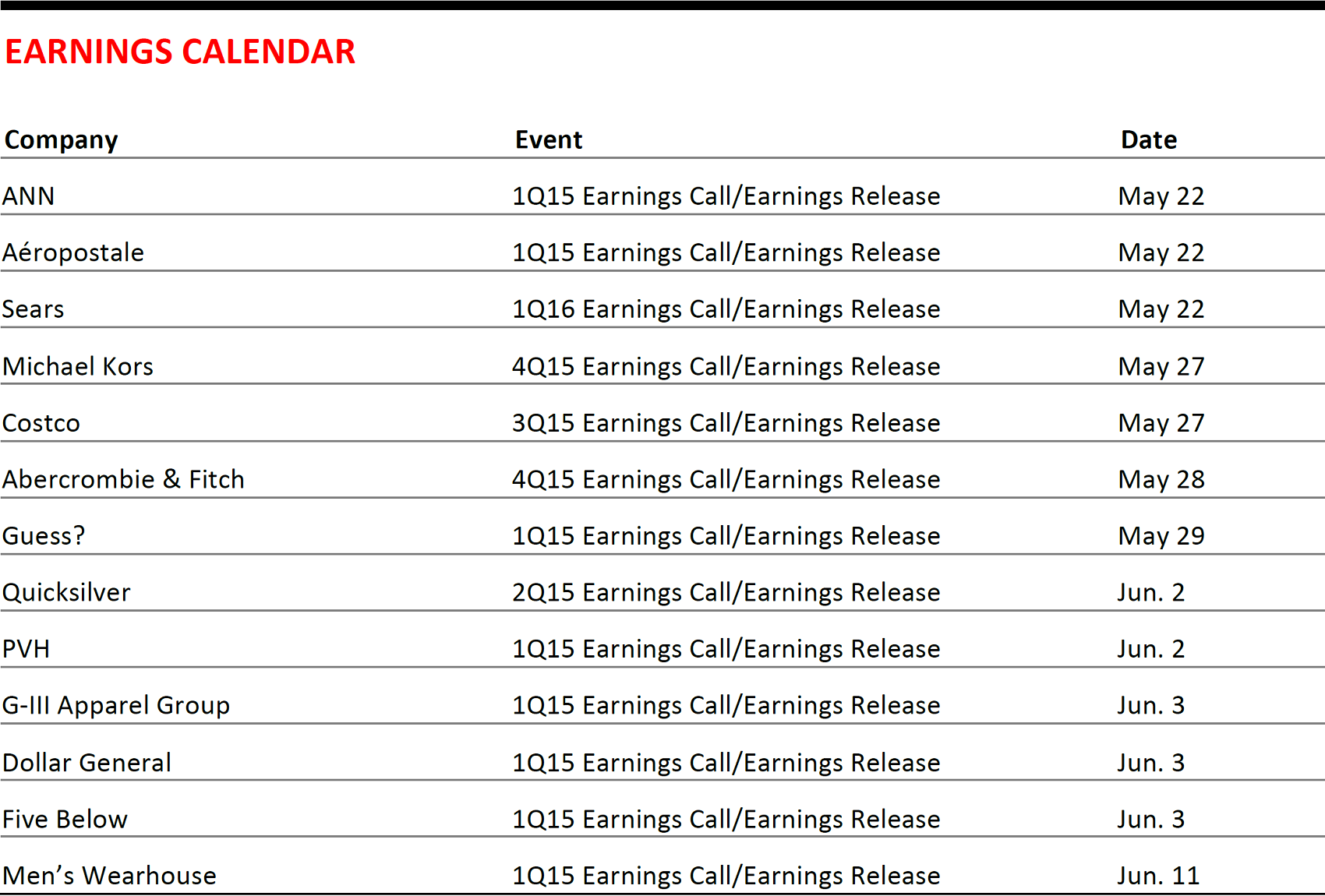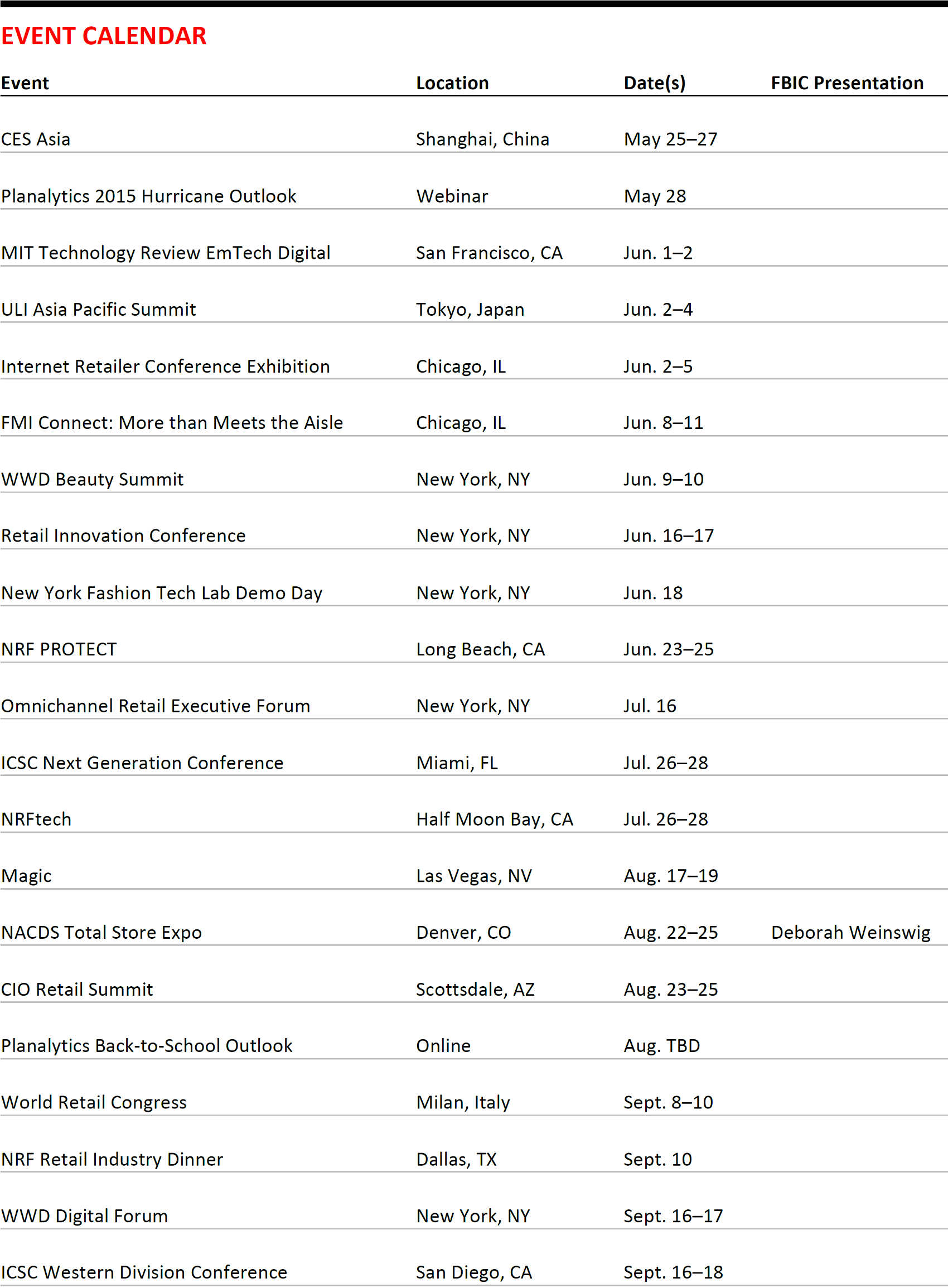
Web Developers
FROM THE DESK OF DEBORAH WEINSWIG
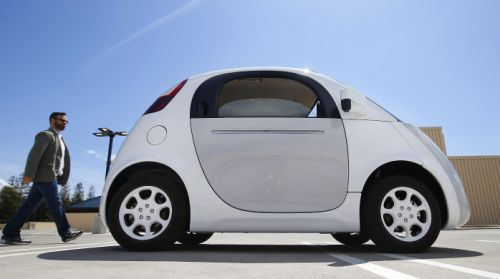 Self-driving cars are coming! Someday...
Google recently announced the launch of a fleet of self-driving cars for testing and further research in the neighborhood around its Mountain View, California, headquarters. The initial launch is to include 25 vehicles, which could increase to between 50 and 100, with the testing area expanding to include different kinds of terrain and weather conditions.
The initial models will lack many of the accessories and conveniences consumers are accustomed to, such as a gas pedal and steering wheel, and they’ll also lack safety features such as airbags. Though these are electric cars, the specs aren’t expected to wow those currently kicking the tires of other electric vehicles such as the Tesla. Google’s car has a top speed of 25 miles per hour, and it can only go 80 miles between charges. In terms of appearance, the car does really look futuristic, resembling an outer-space pod rather than a hot rod.
Although Google’s prototypes seem laughable compared to what we drive today, they have a massive amount of technology under the hood. They contain an arsenal of radars, lasers and cameras that help the car “see” other vehicles and obstacles around it. It’s a huge computing challenge to make an onboard computer see objects around the car and avoid them under normal traffic conditions, but even more difficult to make that computer deal with completely unpredictable events such as a dog or child running across the road, a pedestrian stepping into traffic, or a tree branch falling on the roadway.
We humans are aware of and ready for these events; however, there’s a mountain of computer science going into preparing a machine for them, including technology such as deep-learning systems (formerly called neural networks). We saw amazing demonstrations of image-identification technology at the Consumer Electronics Show (CES) in Las Vegas in January, yet we have heard that Google is the head-and-shoulders leader in driverless cars.
Self-driving cars are coming! Someday...
Google recently announced the launch of a fleet of self-driving cars for testing and further research in the neighborhood around its Mountain View, California, headquarters. The initial launch is to include 25 vehicles, which could increase to between 50 and 100, with the testing area expanding to include different kinds of terrain and weather conditions.
The initial models will lack many of the accessories and conveniences consumers are accustomed to, such as a gas pedal and steering wheel, and they’ll also lack safety features such as airbags. Though these are electric cars, the specs aren’t expected to wow those currently kicking the tires of other electric vehicles such as the Tesla. Google’s car has a top speed of 25 miles per hour, and it can only go 80 miles between charges. In terms of appearance, the car does really look futuristic, resembling an outer-space pod rather than a hot rod.
Although Google’s prototypes seem laughable compared to what we drive today, they have a massive amount of technology under the hood. They contain an arsenal of radars, lasers and cameras that help the car “see” other vehicles and obstacles around it. It’s a huge computing challenge to make an onboard computer see objects around the car and avoid them under normal traffic conditions, but even more difficult to make that computer deal with completely unpredictable events such as a dog or child running across the road, a pedestrian stepping into traffic, or a tree branch falling on the roadway.
We humans are aware of and ready for these events; however, there’s a mountain of computer science going into preparing a machine for them, including technology such as deep-learning systems (formerly called neural networks). We saw amazing demonstrations of image-identification technology at the Consumer Electronics Show (CES) in Las Vegas in January, yet we have heard that Google is the head-and-shoulders leader in driverless cars.
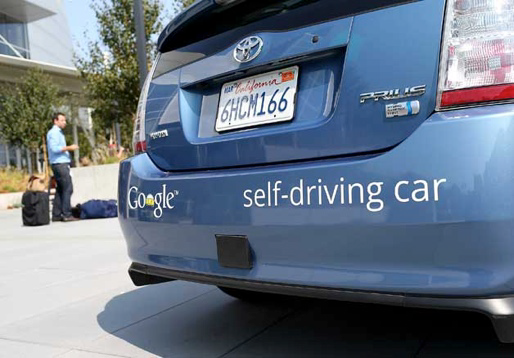 There’s a huge need for accident-free self-driving cars. However, there are many bugs still to be worked out. According to the International Organisation for Road Accident Prevention, there are 1.3 million road deaths worldwide every year, and 90% of these are due to human error. In its first round of testing involving outfitted Lexus SUVs, Google’s cars had 11 minor accidents in six years of testing over 1.7 million miles. Google says that 10 of these accidents were caused by other cars; one was caused by a manually operated Google car. It makes a strong case for defensive driving!
In addition to Google, the major American and European car manufacturers are also working on driverless cars, and Daimler demonstrated one at CES. Ford, though, was more cautious, saying it wanted to introduce a self-driving car when the time was right, rather than being the first to market. There are also rumors that Apple is seeking to widen its consumer appeal beyond computers, mobile devices and smartwatches to include self-driving cars—and that it’s working on its own design. A car would complete the set of Apple-branded products for those of us on the leading edge.
Once these massive technological challenges surrounding self-driving cars have been overcome, the questions will be: Will consumers buy them? Will the price be right? Recalling the benefits of Moore’s Law, computing ability is getting more and more powerful over time, and software keeps getting better and smarter. So, the technology should eventually decrease enough in price so as not to hold back the development of these cars.
We were very pleased to hear that the smart folks over at Google had advanced their self-driving car technology to the point of road testing a fleet of new vehicles. Most of us who commute to work by car will welcome the opportunity to read, sleep, work, or listen to music or watch TV on the way to work, freed from the likelihood of human error causing death, injury or property damage. So many technologies previously found only in science-fiction movies have become real—think cell phones and tablet computers—that we’re optimistic about this futuristic technology, which could improve and save lives. Until then, we’ll keep our eyes on the road and our hands on the wheel.
There’s a huge need for accident-free self-driving cars. However, there are many bugs still to be worked out. According to the International Organisation for Road Accident Prevention, there are 1.3 million road deaths worldwide every year, and 90% of these are due to human error. In its first round of testing involving outfitted Lexus SUVs, Google’s cars had 11 minor accidents in six years of testing over 1.7 million miles. Google says that 10 of these accidents were caused by other cars; one was caused by a manually operated Google car. It makes a strong case for defensive driving!
In addition to Google, the major American and European car manufacturers are also working on driverless cars, and Daimler demonstrated one at CES. Ford, though, was more cautious, saying it wanted to introduce a self-driving car when the time was right, rather than being the first to market. There are also rumors that Apple is seeking to widen its consumer appeal beyond computers, mobile devices and smartwatches to include self-driving cars—and that it’s working on its own design. A car would complete the set of Apple-branded products for those of us on the leading edge.
Once these massive technological challenges surrounding self-driving cars have been overcome, the questions will be: Will consumers buy them? Will the price be right? Recalling the benefits of Moore’s Law, computing ability is getting more and more powerful over time, and software keeps getting better and smarter. So, the technology should eventually decrease enough in price so as not to hold back the development of these cars.
We were very pleased to hear that the smart folks over at Google had advanced their self-driving car technology to the point of road testing a fleet of new vehicles. Most of us who commute to work by car will welcome the opportunity to read, sleep, work, or listen to music or watch TV on the way to work, freed from the likelihood of human error causing death, injury or property damage. So many technologies previously found only in science-fiction movies have become real—think cell phones and tablet computers—that we’re optimistic about this futuristic technology, which could improve and save lives. Until then, we’ll keep our eyes on the road and our hands on the wheel.
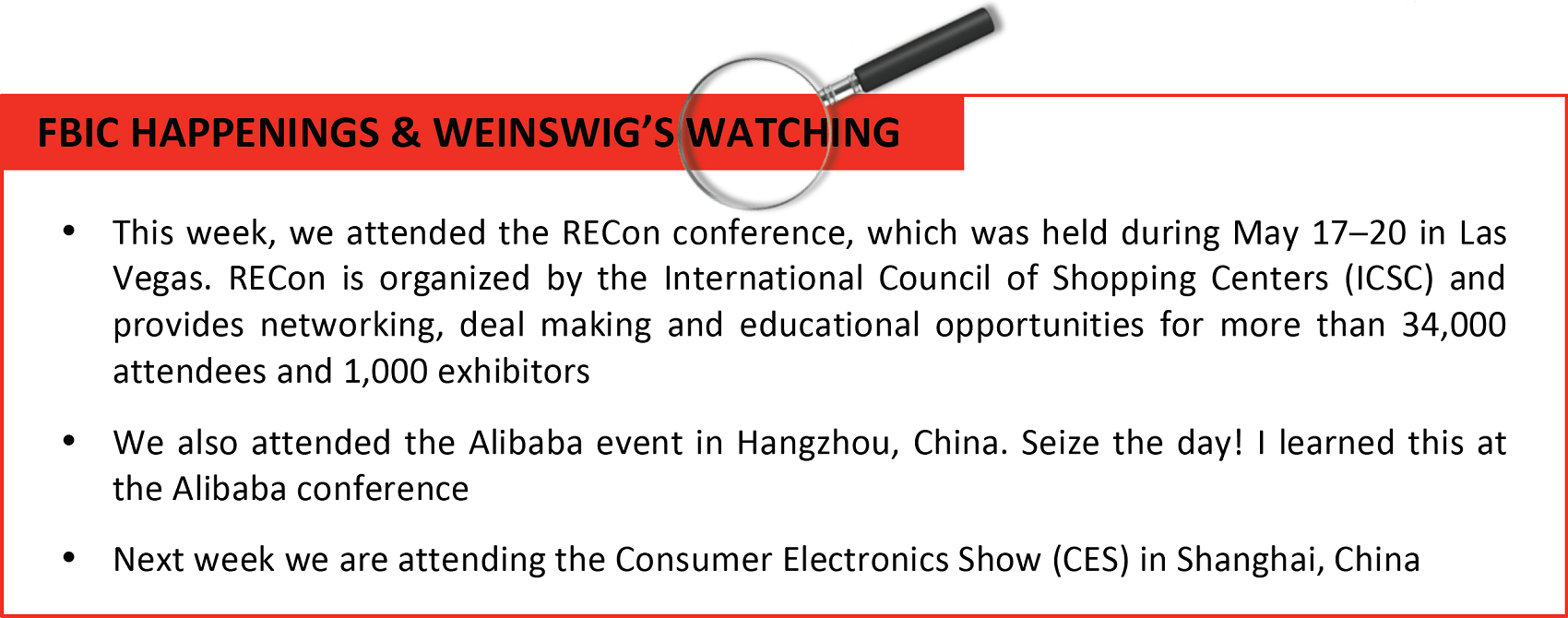

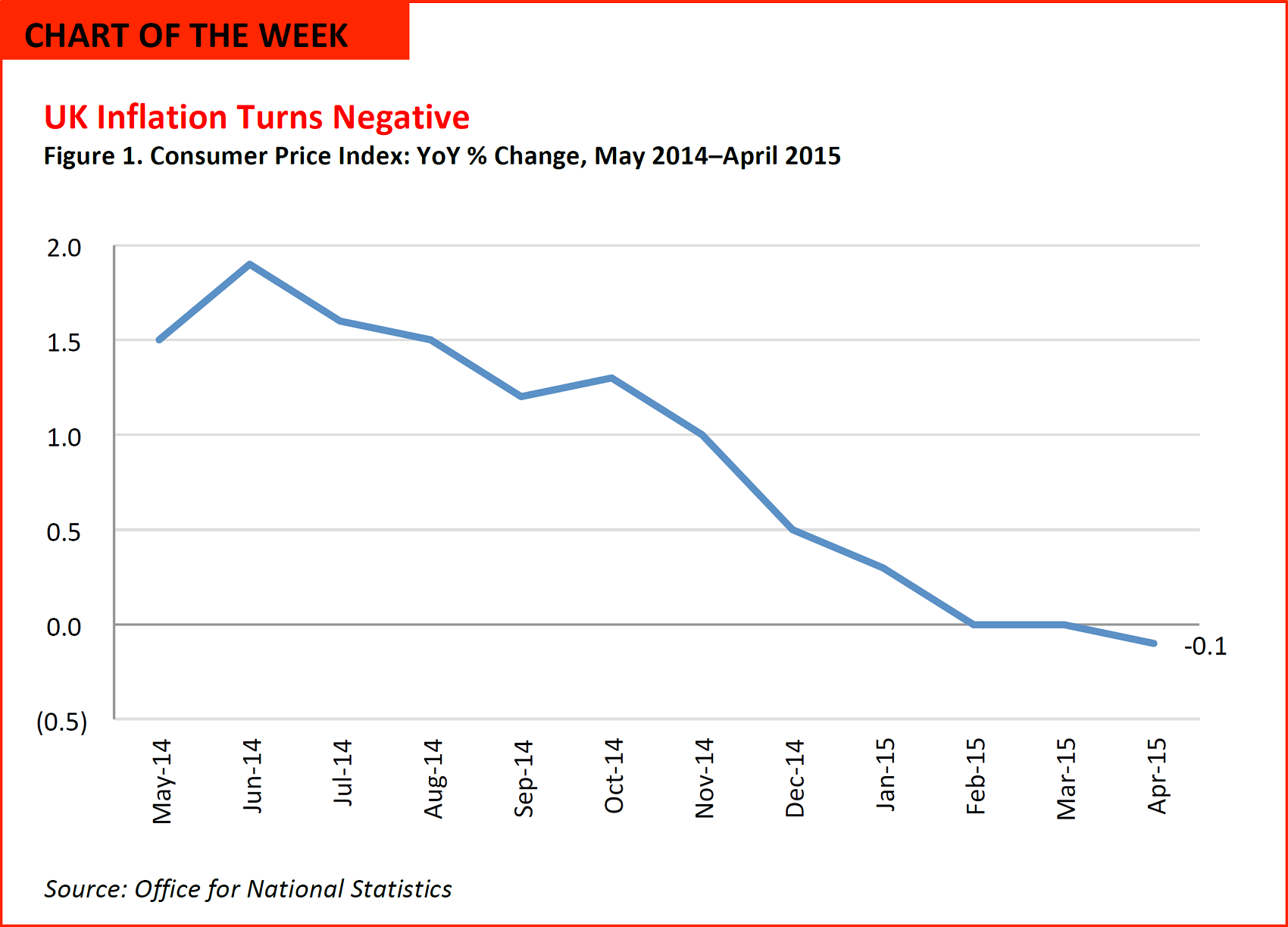
- The UK Office for National Statistics reported this week that UK consumer price inflation turned negative for the first time in 55 years in April 2015.
- Grocery price wars and falling automotive fuel prices depressed the prices of nondiscretionary categories, freeing up shoppers to spend more on discretionary purchases.
US RETAIL TRAFFIC
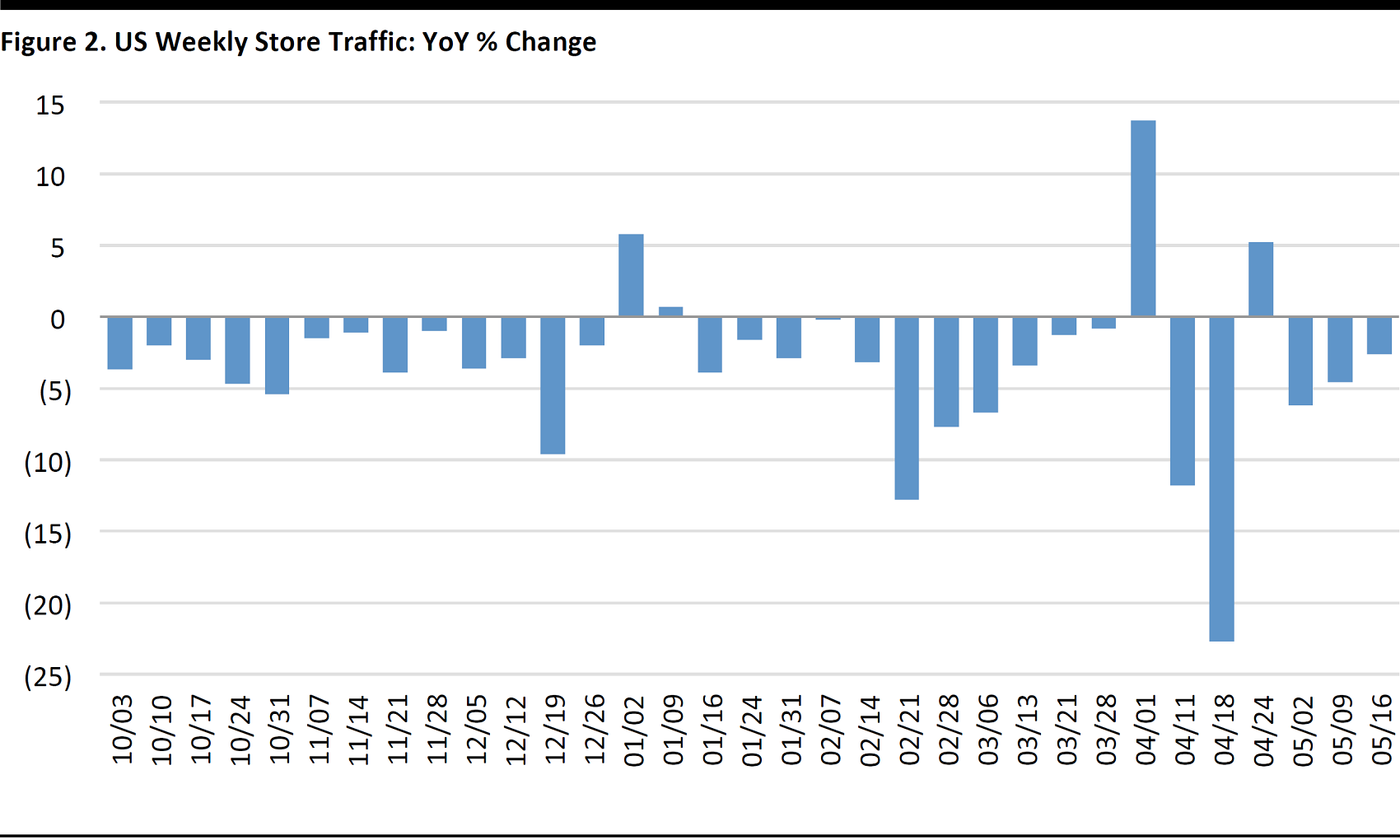
Through May 16, 2015 Source: ShopperTrak
- Weekly traffic in the third week of May declined by 2.6% year over year, an improvement from the prior week that was likely due to pent-up demand for summer products.
- Apparel and electronics store traffic each declined by 1.5%, less than the decline in overall store traffic.
- Traffic is expected to pick up over the coming weeks due to Memorial Day weekend and high-school and college graduation spending.
US REGULAR GASOLINE PRICES
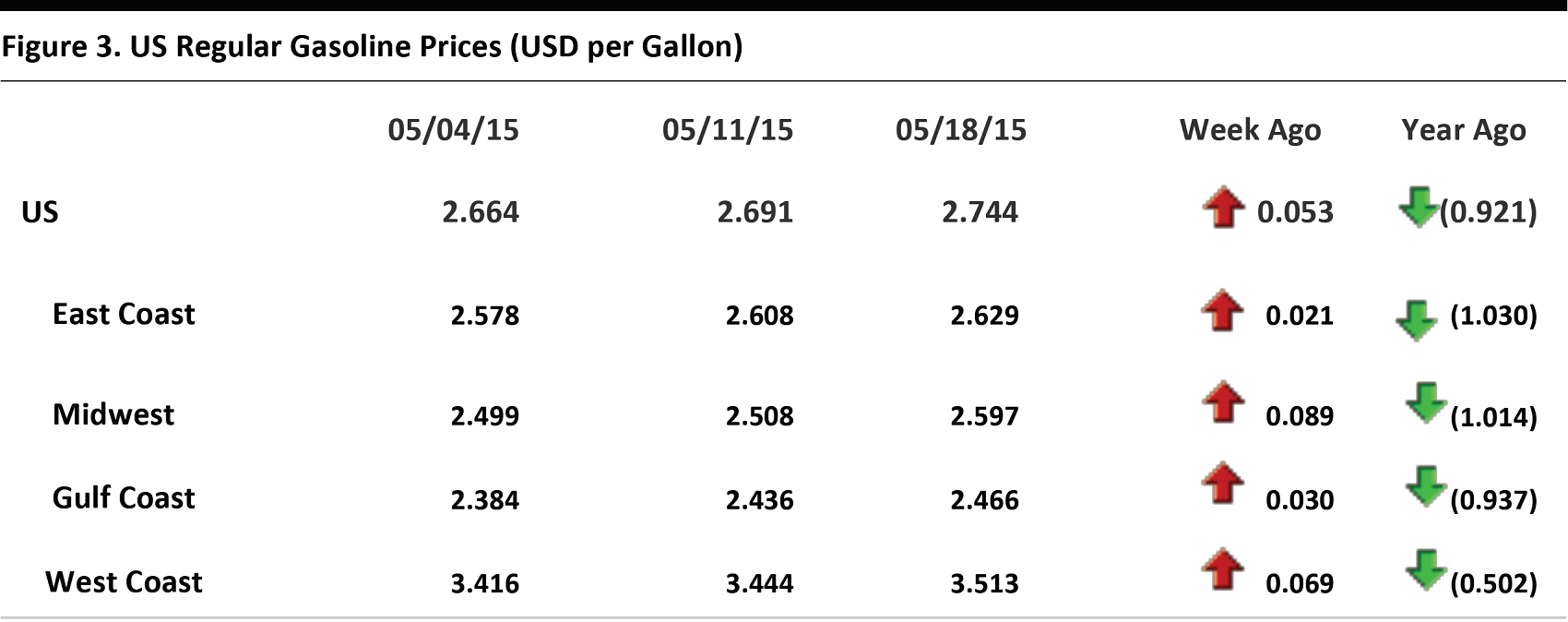
Source: US Energy Information Administration
US RETAIL EARNINGS
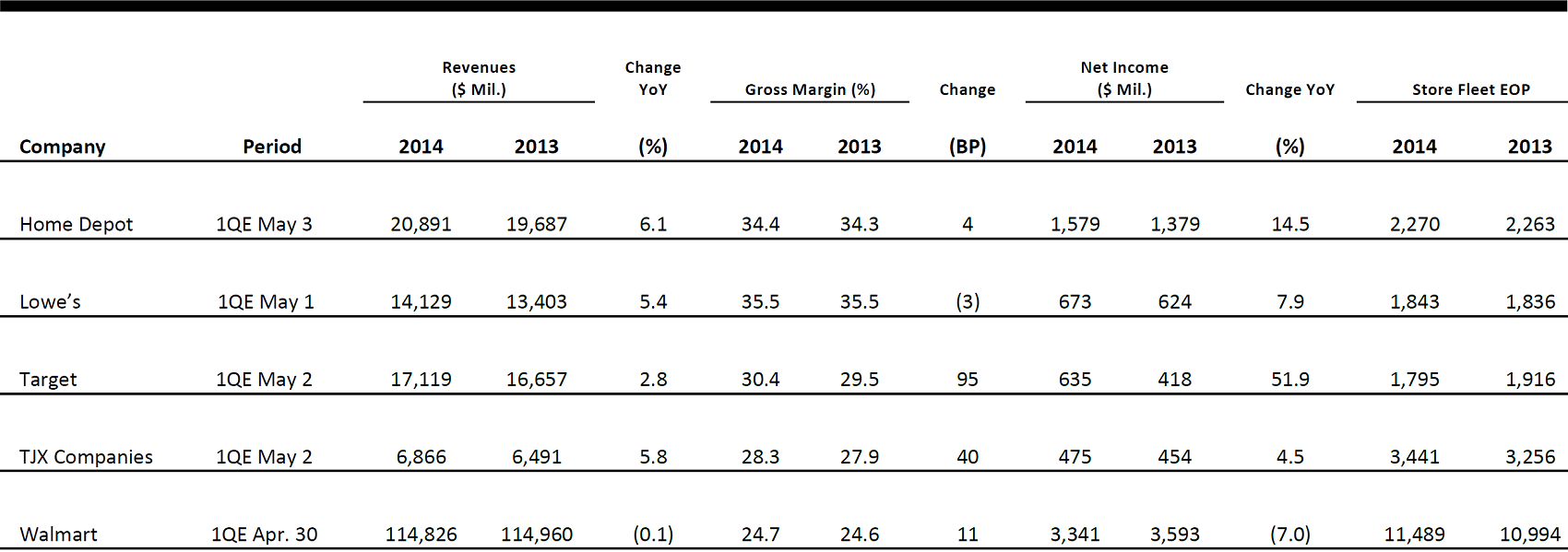
Source: Company reports
US RETAIL HEADLINES
- Starbucks and Spotify announced a new partnership that will connect music-streaming services to 10 million members of Starbucks’ loyalty program.
- Starbucks customers will be able to listen to and curate in-store Starbucks playlists on Spotify and through the Starbucks app. Both apps will also share their reward points systems.
- The parent company of Dress Barn announced it would acquire the parent company of Ann Taylor and Loft for $2.16 billion. The two stores generate about $7 billion in sales.
- The combined company would save about $150 million in three years in sourcing, procurement, transportation, distribution and back-office costs.
- The Wall Street Journal cited unnamed sources that say Google plans to add “buy” buttons in its search results. The displayed products will be available for purchase on Google’s search pages.
- The buttons will take shoppers to Google product pages and will first appear on searches on mobile devices.
ASIA TECH HEADLINES
- Sri Peddu, Managing Director of US-based Powerhouse Ventures, said the firm has decided to focus on India because, “the Indian consumer Internet market is growing at breakneck speed. Plus, Indian entrepreneurs are building world-class products that will change the way global enterprises do business.”
- “There are three key reasons why we are here...the number of VCs in India is minuscule compared to that in the US…new entrepreneurs are coming into the scene [because of]mobile and Internet. Thirdly, we have good access to the India market, ”Peddu said.
- Fin-tech in South Korea is currently hampered by laws that restrict nonbanking companies with more than ₩2 trillion (US$1.8 billion) in assets from owning or investing in financial subsidiaries. Nonfinancial businesses may hold only a maximum 4% stake in financial companies or banks.
- Globally, fin-tech startups are seen as a positive disruptive force to the financial and banking sector. Some industry data indicate that US$12 billion worth of investments were made in such ventures in 2014. South Korea certainly won’t want to be left behind.
- The company’s signature app, APUS Launcher, has 120 million users, ranks in the top five in the Google Play Store in 52 countries, and ranks as the number one personalization app in 73 countries. As of April 30, it was also the seventh-most-popular Android app.
- The startup’s initial growth largely came from emerging markets and the company has gotten little press until now, since its founder, Li Tao, does not speak English.
 Samsung Terminating Samsung Wallet: Membership Card App Didn’t Satisfy Usage Rates
(May 16) ZDNet
Samsung Terminating Samsung Wallet: Membership Card App Didn’t Satisfy Usage Rates
(May 16) ZDNet
- As Samsung prepares to roll out Samsung Pay, it’s shutting down Samsung Wallet, a low-rated, and likely little used, service. The company e-mailed users this week announcing that the service would be terminated June 30.
- Samsung Wallet was Samsung’s competitor to Apple Passbook, which now includes support for Apple Pay. Google Wallet has also evolved over time to become a solid payment app with support for loyalty and gift cards.
- Solitude over extended periods raises a risk of self-estrangement and feelings of powerlessness, and can lead to depression. The robot avatar OriHime aims to eliminate isolation, not as a conversation partner, but as a facilitator of connections between humans.
- Kentaro Yoshifuji, CEO of Ory Laboratory, which created OriHime, endured years of isolation when he stayed home from school due to stress and illness. He emphasized that the important thing is not connecting human and robot, but connecting human and human.
- JD, Alibaba’s biggest e-commerce competitor in China, and enterprise resource planning software firm Kingdee International Software Group announced that JD will invest HK $1.3 billion (US$171 million), and take a 10% stake,in Kingdee.
- Enterprise resource planning software is used to manage many aspects of a business,including inventory, expenses, manufacturing, logistics and sales. More than 50 million subscribers across 4 million businesses subscribe to Kingdee’s services.
- Bangalore-based startup Greenopia announced that its crowdfunding campaign on Wishberry was successful. It surpassed its funding goal and raised INR 958,500 (US$15,000) in 45 days.
- Its key offering, an Internet-enabled smart pot, which is also called Greenopia, has sensors that can tell if the soil conditions are right and if the plant is wilting. The information can be remotely accessed using a mobile application.
EUROPEAN RETAIL EARNINGS

Source: Company reports
EUROPEAN RETAIL HEADLINES
- Spanish fashion brand Mango will launch a new collection of clothing in the run-up to Ramadan. It will be available on June 8 in its Arabic-language stores and online.
- The collection will focus on evening wear and will include tops, gowns, dungarees and palazzo pants.
- British fashion brand Burberry said it now expects a £40 million (US $62.6 million) profit dropin its current fiscal year compared to its previous forecast.
- Falling sales in Hong Kong due to lower customer numbers has been cited as a reason for the revision, as has a strong British pound.
- Footwear retailer Schuh paid out bonuses totaling £25 million (US $39.1 million) to over 3,000 staff. The payout follows the maturing of a scheme agreed to when Schuh was acquired by Tennessee-based footwear retailer Genesco in 2011.
- One of the conditions of the sale was the creation of a bonus scheme to reward employees for continued good performance of the business. The amount of bonus payable to staff was dependent on the business hitting financial targets over four years.
- The Consumer Price Index (CPI) fell 0.1% for the year through April 2015, according to the Office for National Statistics. Rates have been forced down by supermarket price wars and falling fuel costs.
- Since the CPI began, the UK has never experienced a period of deflation. The current situation is expected to cause disposable income to rise at its fastest rate since 2007.
- UK fashion retailer New Look has been sold to South African investment group Brait. The group now owns a 90% stake in the fashion retail business, with the Singh family retaining the remaining 10%.
- New Look Chief Executive Anders Kristiansen, Chief Financial Officer Mike Iddon and Chief Creative Officer Roger Wightman will all remain in the business.
- German discount retailer Aldi announced plans to expand into Italy, following in the footsteps of its rivals Lidl and Carrefour.
- The group is Europe’s biggest discount retail chain, with over 5,000 stores in nine countries. Aldi had not entered a new market since opening its stores in Hungary in 2008.
- German brand Esprit has said it expects a “substantial” loss for the year ended June due to poor performance in the Chinese market and a warmer-than-expected winter in Europe.
- The retailer’s turnover in China fell 28.3% in local currency terms for the 2013–2014 financial year and 21.6% for the first half of this year. In Europe, which accounts for almost 80% of Esprit’s business, a mild winter forced the company to discount many heavy coats and jackets, which has affected its turnover.
LATAM RETAIL HEADLINES
- After a bumpy start, Mexico’s new textiles aid package is now running smoothly.
- The rules require that all fiber and apparel importers complete an official registration showing their legal incorporation and current paid-up tax status.
- Many small firms initially struggled to comply with the new rules, causing delays.
- Chile’s GDP grew by 2.4% year over year in the first quarter of 2015, its fastest rate in a year.
- Economists had expected growth of 2.2%.
- Recoveries in consumption and exports, particularly in mining, were cited as the sources of the economy’s strength.
- An expansion of the Panama Canal is expected to be completed in 2016, deepening, broadening and increasing the number of lanes.
- Most, though not all, of today’s container ships are expected to be able to traverse the new lanes.
- The expanded canal will provide another option for retailers and manufacturers when the US West Coast ports are full or unavailable.
- FEMSA could raise about $9 billion from a sale of Heineken shares following the expiration of its lock agreement in April.
- The company’s war chest would hold approximately $11 billion, including cash on hand.
- FEMSA is already the world’s largest Coca-Cola bottler and has approximately 800 pharmacies in Mexico, which could be expanded via M&A.
- Retail sales in Brazil declined by 0.9% year over year in March, which was greater than the 0.4% decline that was the median analyst estimate.
- The drop was also steeper than February’s 0.4% year-over-year decline.
- Causes include the government’s boosting of electricity prices among other items and inflation that has been running ahead of the government’s target.
